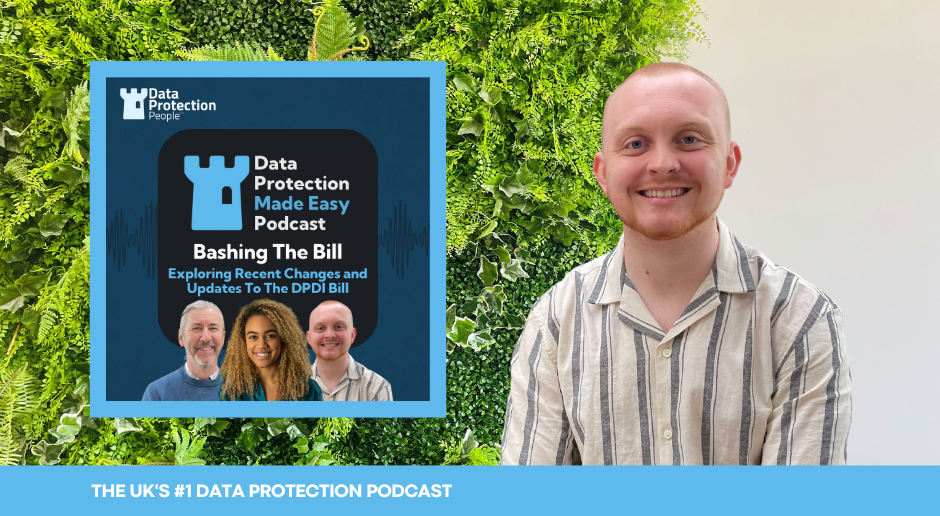Exploring Individual Rights
The ever-evolving field of data protection law can be a minefield for businesses of all sizes. Balancing the rights of individuals with the operational needs of your organisation is a constant challenge, especially when it comes to fulfilling individual rights requests. During this week’s episode of the Data Protection Made Easy podcast we will be Exploring Individual Rights.
This upcoming podcast, designed specifically for Data Protection Officers (DPOs) and Data Champions, delves into the complexities surrounding individual rights in UK data protection law. We’ll explore real-world scenarios, practical solutions, and best practices to help you navigate these requirements efficiently and effectively.
Balancing Act: Respecting Individual Rights While Meeting Business Needs
The General Data Protection Regulation (GDPR) grants individuals a powerful set of rights regarding their personal data. These rights include access, rectification (correcting inaccuracies), restriction of processing, and even erasure (the “Right to be Forgotten”). While upholding these rights is essential for building trust and fostering responsible data practices, fulfilling them can sometimes create friction with day-to-day business operations.
Our upcoming podcast dives head-first into the challenges faced by organisations when responding to individual rights requests. Here are some of the key hurdles we’ll discuss, along with potential solutions for DPOs and Data Champions:
Resource Constraints: Verifying requests, gathering information from disparate systems, and responding within the legal timeframe can be incredibly time-consuming and resource-intensive, especially for smaller businesses. This can lead to backlogs and delays in fulfilling requests.
- Solutions: Prioritise requests based on urgency and potential impact. Streamline verification processes to expedite confirmation of data subject identities. Utilise data mapping exercises to understand where personal data resides within the organisation, allowing for faster retrieval.
Data Location and Accessibility: Personal data can be scattered across various databases, cloud storage solutions, and even physical records. This fragmented data landscape makes it difficult to locate and retrieve specific information quickly when responding to individual rights requests.
- Solutions: Implement a comprehensive data mapping exercise to create a clear picture of where personal data is stored and how it flows throughout the organisation. Invest in data management tools that can centralise data storage and simplify search functionalities.
Third-Party Involvement: Fulfilling an individual’s right to access, rectify, or erase data might require coordination with third-party vendors who also hold the data subject’s information. This adds another layer of complexity to the process, requiring communication and potential data sharing with external entities.
- Solutions: Establish clear contractual agreements with third-party vendors outlining data protection responsibilities. These agreements should address data subject rights and how requests will be handled collaboratively. Consider implementing data sharing agreements that facilitate secure and efficient data transfers when necessary.
Streamlining the Response of individual rights: Practical Solutions for DPOs and Data Champions
The good news is, there are concrete steps you can take to streamline the process of handling individual rights requests, minimise disruption, and ensure compliance with data protection regulations. Our upcoming podcast will delve into these practical solutions, empowering DPOs and Data Champions to navigate these requests efficiently:
1. Standardised Procedures: The Power of Consistency
Developing clear and well-documented internal processes for handling individual rights requests is a game-changer. These standardised procedures act as a roadmap, ensuring consistency across your organisation and saving valuable time. Here’s how:
- Reduced Training Time: Clearly defined procedures make training new staff members on handling individual rights requests more efficient. Consistency ensures everyone is on the same page, minimising errors and delays.
- Improved Efficiency: Standardised processes establish a clear workflow for handling requests, streamlining each step from verification to fulfillment. This reduces the risk of tasks being overlooked or duplicated.
- Enhanced Accuracy: Well-documented procedures help staff handle requests accurately and consistently, reducing the likelihood of errors that could lead to legal repercussions or reputational damage.
2. Technology Solutions: Leverage Automation for Efficiency
Data management tools can be your secret weapon in streamlining individual rights requests. These tools automate various tasks, freeing up valuable staff resources to focus on higher-level activities. Here are some functionalities to explore:
- Data Search and Retrieval: Leverage data discovery features to locate relevant personal data quickly and efficiently, even if it’s spread across multiple systems.
- Data Redaction: Utilise automated redaction tools to anonymise sensitive information before providing data to the data subject, ensuring compliance with data minimisation principles.
- Reporting and Audit Trails: Implement data management tools that generate reports and maintain audit trails, simplifying record-keeping and demonstrating compliance with data subject rights.
3. Communication is Key: Building Trust Through Transparency
Clear and consistent communication with the data subject throughout the process is crucial. Here’s how effective communication fosters trust and reduces frustration:
- Setting Realistic Timelines: Be upfront about the timeframe for responding to requests. This helps manage the data subject’s expectations and avoids unnecessary inquiries.
- Regular Updates: Keep the data subject informed throughout the process. Provide regular updates on the status of their request, even if it’s just to acknowledge receipt and confirm it’s being addressed.
- Clear and Concise Language: Use plain language that is easy for the data subject to understand. Avoid technical jargon and legal terminology whenever possible.
The Right to Erasure: When “Forgotten” Isn’t So Simple
The “Right to Erasure,” also known as the “Right to be Forgotten,” empowers individuals to request the deletion of their personal data under certain circumstances. While this sounds straightforward, fulfilling erasure requests can be surprisingly complex. Our upcoming podcast dives into scenarios where achieving complete erasure might be difficult, and explores alternative solutions for DPOs and Data Champions to navigate these situations while complying with data protection law.
Here’s why achieving complete erasure can be challenging:
-
Legal and Regulatory Retention Requirements: Businesses may have legal or regulatory obligations to retain certain types of personal data for a specific period. For example, financial institutions might need to keep transaction records for tax or anti-money laundering purposes. In such cases, complete erasure is not possible.
-
Backups and Archived Data: Data backups and archives create a grey area for the Right to Erasure. While actively used data can be erased, backups and archived data pose challenges. Striking a balance between fulfilling erasure requests and adhering to data retention policies is crucial.
Alternative Solutions for DPOs and Data Champions:
-
Data Anonymisation: In situations where complete erasure isn’t possible, anonymisation can be a viable alternative. This involves removing any personally identifiable information (PII) from the data, rendering it impossible to link it back to the individual. Anonymised data can still be used for statistical or research purposes, while protecting the individual’s privacy.
-
Clear Communication and Justifications: When complete erasure is not possible due to legal or technical reasons, clear communication with the data subject is essential. DPOs should provide a clear and concise explanation for why their request cannot be fully met. Transparency fosters trust and helps manage expectations.
The Importance of Data Retention Policies:
Having clear and up-to-date data retention policies in place is crucial for navigating the Right to Erasure. These policies should outline:
- The specific types of personal data collected by the organisation.
- The legal and regulatory requirements for data retention.
- The criteria for determining when personal data can be erased.
Subject Access Requests (SARs): Mastering the Maze of Personal Data
Subject Access Requests (SARs) empower individuals to access the personal data a business holds on them. This right to transparency is crucial for building trust, but fulfilling SARs can be a time-consuming and resource-intensive process for organisations. Our upcoming podcast equips DPOs and Data Champions with best practices to navigate SARs efficiently:
1. Streamlined Verification: Preventing Unauthorised Access
Verifying the identity of the data subject is the first crucial step in handling a SAR. Streamlining this process ensures you’re providing information to the rightful individual and prevents unauthorised access to sensitive data. Here’s how:
- Multi-Factor Authentication: Implement robust verification methods other than just passwords. Utilise multi-factor authentication (MFA) to add an extra layer of security, requiring additional verification factors like codes sent to a phone or email.
- Clear Instructions: Provide clear and concise instructions on how individuals can submit verification documents within your SAR response process. This reduces delays and ensures you receive the necessary information to verify identities promptly.
2. Clarity is Key: Providing Data in an Understandable Format
The information provided in response to an SAR should be clear, concise, and easy for the data subject to understand, even if they lack a technical background. Here’s how to ensure clarity:
- Plain Language: Avoid technical jargon and legal terminology whenever possible. Use clear and concise language that the average person can understand.
- Structured Format: Present the information in a well-structured and organised format. Consider using tables, headings, and bullet points to improve readability.
- Defining Terminology: If including technical terms is unavoidable, provide clear definitions within the SAR response document itself.
3. Data Mapping: The Secret Weapon for Efficiency
Having a clear understanding of where personal data is stored and how it’s used within your organisation is a game-changer for handling SARs efficiently. Data mapping involves creating a comprehensive inventory of your data landscape. Here’s how it benefits DPOs and Data Champions:
- Faster Retrieval: Knowing where specific data resides eliminates the need to search through multiple systems, significantly reducing the time it takes to locate and retrieve relevant information for SAR responses.
- Reduced Errors: A clear data map minimises the risk of overlooking data sources, ensuring a more thorough and accurate response to the SAR.
- Improved Compliance: Data mapping supports overall data governance efforts, making it easier to demonstrate compliance with data protection regulations during audits or investigations.
Building a Culture of Data Protection: Proactive Strategies for DPOs and Data Champions
While effectively handling individual rights requests is crucial, our upcoming podcast delves deeper, emphasising the importance of proactive data protection. By fostering a culture of data privacy within your organisation, you can minimise risks, streamline processes, and build trust with customers and regulators. Here, we’ll explore key strategies DPOs and Data Champions can implement:
1. Empowering Staff Through Education
Staff training programs are the cornerstone of a strong data protection culture. Educating employees on data protection principles, individual rights, and internal procedures equips them to handle personal data responsibly:
- Data Protection Fundamentals: Train staff on core data protection principles like data minimisation, purpose limitation, and lawful processing. This empowers them to make informed decisions about data collection and handling.
- Individual Rights Awareness: Ensure staff understand the individual rights enshrined in data protection regulations, such as the right to access and the right to erasure. This knowledge allows them to effectively respond to inquiries and requests.
- Internal Policy Training: Train staff on your organisation’s internal data handling policies and procedures. This fosters consistency and ensures everyone is on the same page regarding data protection practices.
2. Proactive Risk Management with Privacy Impact Assessments (PIAs)
Privacy Impact Assessments (PIAs) are a proactive approach to data protection. By conducting PIAs for new projects and initiatives that involve personal data, you can identify and mitigate potential risks before they arise:
- Early Risk Identification: PIAs help identify potential privacy risks associated with collecting, using, or storing personal data. This allows for early intervention and implementation of appropriate safeguards.
- Data Protection by Design: PIAs encourage integrating data protection considerations into the design phase of new projects. This ensures data privacy is prioritised from the outset.
- Enhanced Compliance: Regular PIAs demonstrate your organisation’s commitment to data protection and can be valuable evidence during audits or investigations.
3. Clear and Accessible Internal Policies
Having clear, up-to-date, and easily accessible internal policies on data handling and individual rights empowers staff to make informed decisions in their daily work:
- Comprehensive Policies: Develop internal policies that cover the entire data lifecycle, from collection to storage, use, and erasure.
- Accessibility is Key: Ensure policies are readily available to all staff in a user-friendly format, such as on a central company intranet or knowledge base.
- Regular Reviews and Updates: Regularly review and update internal policies to reflect any changes in data protection regulations or your organisation’s practices.


























